#this isn't the show where only one person can be the poorly written so-called /smart one/
Explore tagged Tumblr posts
Text
I have a question for people who fervently argue that Arya has no potential for politics but think that Sansa will be one of the main political characters, and I'm asking this seriously.
If Arya learning multiple languages, how to tell + detect lies, how to rule her face so she doesn't reveal her emotions, being able to blend into different situations, thinking quick on her feet, knowing the importance of gathering information, being someone who makes friends wherever she goes, convincing a FM to help free Northern prisoners and participating in a coup, etc. don't make Arya capable of participating in politics...what exactly is it that you think Sansa will be doing as a political figure?
#arya stark#sansa stark#asoiaf#cause I would genuinely like someone to explain to me why people argue so passionately against Arya being a political character#to the point that they pretend there's zero overlap between what she's learning and what a 'political' character should know#I always see people reduce her to being a fighter and ignoring her other skills so it's obvious you think they could be useful so?#/politics/ is such a broad term too...there are so many different ways for a character to be political and I just don't understand#why people are so restrictive when thinking about how characters can occupy that space#this isn't a dig at Sansa this is me genuinely wondering what you guys think being political means and what she'll be doing#if you don't think Arya having any of these skills qualify her 😭#Arya and Sansa can both be political characters it isn't an either or scenario#this isn't the show where only one person can be the poorly written so-called /smart one/#I don't need any /no one says this!/ comments either...if you aren't someone who thinks like this then feel free to move on
197 notes
·
View notes
Note
Misa for the ask meme!
Oh, thank you! ; - ;
Misa Amane, hmm.. my least favorite thing about her is her static personality. She'd be a lot more interesting if Ohba actually bothered to give any character besides Light a legitimate arc. She never grows, never changes, she just stays the same. If she were written in a way where the cracks start to show (her "relationship" with Light, what they're doing) and if she decided she didn't want that lifestyle anymore, she wants to be loved by a true and honest person, not playing pretend with a serial killer...I think that realization and Misa doing her best to try and escape that situation would have been such a relatable masterpiece.
As far as favorite thing goes, I'm going to say her personality. When she's not Kira, she's really endearing, cute, and fun. Her character is definitely an amazing foundation that could have been so much more, in hands that actually cared. Aside from that, her fashion sense. Even when I forgor about Death Note for however many years, I STILL wear my hair like this cute lil bitch because she's just so iconic. She's a lot different than the rest of the cast, where they're so calculating and secretive. Misa is bold, and creative. I would have loved an AU where she isn't Kira, but somehow ends up in this mess anyways and works as a spy for L, along with Matsuda. Because their manager-model duo was just too fun.
Fanon pet peeves? I don't really have any. Aside from a large majority of people hating her. She's not perfect, like anyone in the series she has her own flaws and fuck-ups, but the fandom can really treat her poorly.
And yes, contrary to what many would like to say, she is smart - just not a literal genius like Light, L, Mello, Near...y'know, the ones who are intentionally supposed to have near-superhuman intelligence. Funny thing is, I honestly feel that half of the fans who call Misa stupid are probably...not much smarter than her. If you ask me, she's of "average" intelligence, but also - there's no need to shame a character (or real person for that matter) for not...being a genius. I know it's hard in a show where most of the main characters have above-average intelligence, but that is really not the norm.
Want to know what else pisses me off with how the fandom treats Misa? They neglect her traumatic past. Granted, you can definitely pin this on Ohba not really giving much of a fuck when it comes to backstories, and that we only get a short glimpse of her story...but she lost her parents and was almost assaulted by a deranged fan. Within a short amount of time. When she was a young adult. Like, this is no excuse for her wrongdoings, but for fuck's sake it definitely explains some shit.
If she had a dedicated episode similar to Mikami did, I bet a lot of people would have a lot more empathy for her character. I can't really fault people for not caring when her backstory is brushed under the rug faster than my weed when someone opens my door, but still.
Also, people saying they hate her, "because she's annoying" I don't even try to discuss this with. Whether their opinion is valid or not I don't care, I've just had enough of female characters hated for being "annoying". It's just an argument I don't want to have anymore.
Send me a character and I'll tell you my least favorite and favorite thing about them and the fanon pet peeves I have with them
12 notes
·
View notes
Text
Spring Anime 2021: Embarrassment of Riches
So this current anime season absolutely stinks, which just makes the last one look even more impressive. Well, maybe not all of it...
Zombieland Saga Revenge
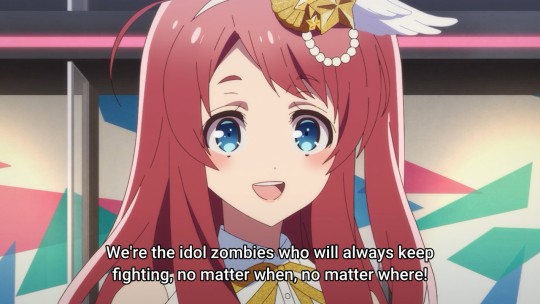
First off, you don't need to tell me that the following is a severe outlier opinion. We good? Ok. ZLSR is, in a word, subpar. I liked S1 back in the day, but it was already in the process of getting lazy towards the end. S2 continues this trend and is basically just another idol show. And as someone who actually does watch other idol shows I have to say that it's not a particularly good one of those either. The zombie gimmick has mostly stopped mattering and we're just doing what every idol show does, only with the odd occasional sight gag. The alleged subversive qualities mostly amount to a flashback for Yuugiri, which is admittedly the best part of the show but feels like it barely has anything to do with anything. Apart from that, it's a bunch of generic idol plots, rehashed character beats, shoddy attempts at twists (while not connecting to any setups from S1), and the obligatory "idols give us hope" ending, which is terribly hackneyed and flat out bad. Tae gets further memed into the ground, because of course she does. And there's stuff that was simply never good to begin with, like Kotarou and his comedy schtick, which gets truly insufferable now that there's no qualities to distract from it. It really makes me think that S1 wasn't even all that good to begin with and seems like an attempt to turn this surprise success into an easy money longrunner with no edge and no ambitions. "The idol show for people who don't watch idol shows" indeed, but not the way you mean it. 4/10
Bakuten
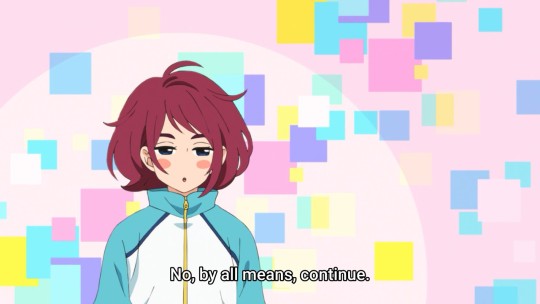
But not to dwell on the failures, with the second show we're already above the cut — barely. This one got my attention with its really impressive performance scenes early on and it totally sticks to that, which is even more impressive. But besides that? Well, this is by far the most predictable show in a season where I watched an unambitious Kiraralike and put ZLS on blast for having no ideas. The characters are a mixed bag, some are cool (Shida, Asawo), some are very annoying (Mashiro), but those are the supports. The main cast is extremely one-dimensional, which is fine until they try to heap a ton of pathos on their lead, which doesn't go well. But I guess execution matters, and Bakuten is slick enough to get by. Writing this down in stark daylight I feel like I overrated this show somewhat (I actually put it over the next one originally, which definitely doesn't hold up when thinking about it), but I was indeed mostly entertained. 6/10
Yakunara Mug Cup mo
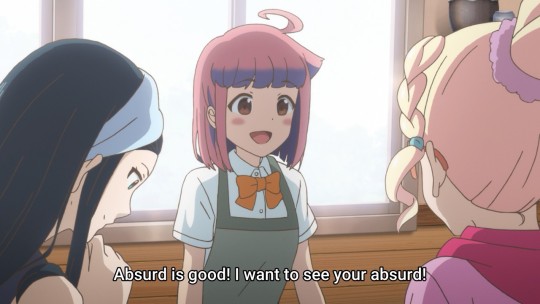
Yeah. Of course Mug Cup definitely doesn't invent or subvert anything either, but it's a pretty good Kiraralike that's always entertaining to watch. Explaining the qualities of such a nothing genre is as difficult as ever, but it mostly comes down to me liking the characters and it having nothing to annoy me. It's shorter than normal, which is a plus for slim shows like this. And yeah, you can make an excessive amount of dick jokes with the clay fondling. That helps too. Looks are just fine, pleasant but nothing out of the ordinary. Comfy low-effort anime. 6/10
Vivy: Fluorite Eye's Song
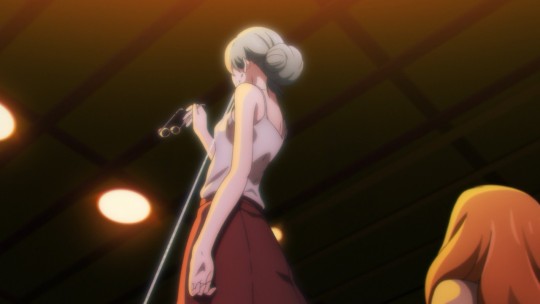
This one is decent, but sadly still a major letdown. Because the first few episodes of Vivy were excellent and kicked ass, but then it became increasingly clear that the writing can't cash the checks the ideas wrote while the action starts running into severely diminishing returns. Vivy just keeps slowly getting worse and worse as it goes on, not by a huge amount each episode but by the end there's a pretty sizeable gulf between potential and result. Going into detail would probably be a little much for this venue because there's a lot, but from the top level view the issue is that while Vivy has good fundamental ideas and steals at the right places, it just isn't a smart show — it's schlock, and by the end, poorly thought out schlock that tries to smooth out every problem with liberal application of the big feels hammer and le epic twist at that. Yeah, couldn't tell that the Re:Zero dude was aboard here, for sure. That said, it still works pretty well as entertaining schlock that is not to be taken too seriously, and the characters are generally just very fun to watch even when they're doing stupid things. Still, I can't in good conscience rate this higher than Beatless, a show that looks like butt but properly executes on its ideas. 6/10
Super Cub
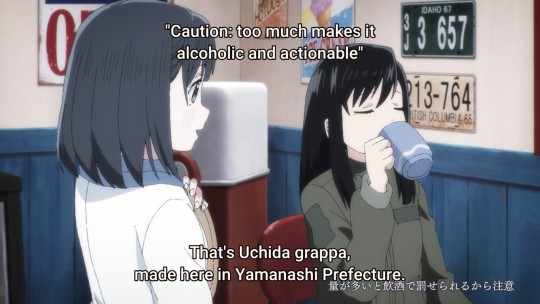
So this is 100% a Honda commercial, and I got really mad a Yuru Camp last season for being a blatant shill. Yet I'm feeling this, what gives? I think the main difference is that Super Cub is specifically a commercial for one product (and a very iconic product at that), while Yuru Camp is so all over the place that it ends up mostly a commercial for consumerism in general. And when Super Cub goes too hard on the product (which it does), it's at least pretty entertaining. That's something about Super Cub in general: It goes hard. Your regular Kiraralike this is not, because it's uncommonly slow, focused and moody - yes, it almost measures up to Yuru Camp at its best and demolishes it at its worst. Also, it's just extremely amusing to see sadblob Koguma grow a huge grizzly biker beard and become a badass outlaw dad to her goofy wife and cute daughter, all thanks to the power of afforable personal transportation. Needless to say, that can get unintentionally silly, but Super Cub has so much charm that it doesn't matter — it's great when it's good and still funny when it's not. 7/10
Shadows House
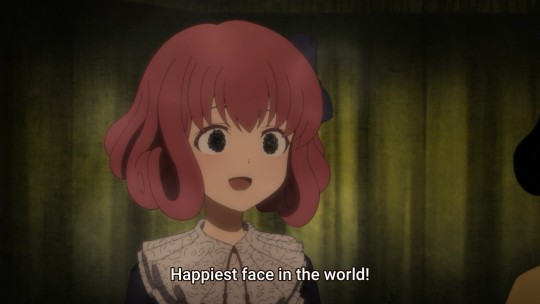
Shadows House turned up with a lot of potential, and I have to say it at least delivered on most of it. It has some problems; notably I'm not a fan of how the entire middle turned out to be a tournament arc of sorts that seems curiously inspired by Resident Evil memes, crest-shaped intentations and boulder punching included. I also think that this is a show that would be perfectly fine without explaining much, but I guess it is a shounen manga after all so we got dumped on eventually anyway. At least that came late - close relative Promised Neverland didn't show that much restraint. Shadows House is generally well written though, with great characters, interesting interactions and a great hook. But what really makes it memorable is that it's exceptionally good at the cute/creepy contrast, something that is often tried but rarely works as well as here, with great character designs and very appropriate production. I hope this gets a sequel, because it seems like it's just getting started. 7/10
SSSS.Dynazenon
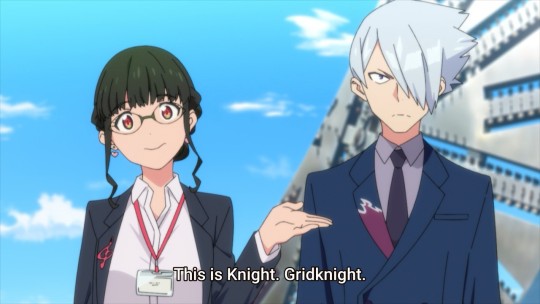
Coming in with a fondness for Gridman, Dynazenon didn't have to do much to convince me. The surprise though is that it's not a rehash even if it's basically the same show, a character drama where occasionally huge and goofy fights break out. Dynazenon is Gridman done better, and the interesting part is how it accomplishes this - mainly by being far more conventional. I do appreciate that Gridman went for something weird and almost experimental, but that only really paid off towards the end while most of the show was a distraction/holding pattern. It just didn't feel like there was enough material for a full series there, more like a movie maybe, if even that. Dynazenon fixes this by just being a TV show, with an actual cast of characters that each have their own arc. And by spreading the material this way, Dynazenon ends up having a lot more nuance than its intensely focused predecessor, while having the same themes and not actually being any deeper. In a way, Gridman ends up looking like the spinoff in retrospect, while Dynazenon is the full package. 8/10
Thunderbolt Fantasy S3
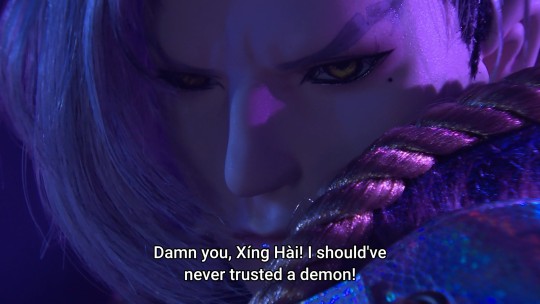
So how good was this season? So good that Thunderbolt Fantasy doesn't end up at the top, that's how. And all the elements that made Tbolt such a sure thing are still there, big hammy puppets doing stunts and scheming never gets old. However, I do have to note that at this point, the writing appears to have gotten too comfortable. I don't expect it to ever top the amazing S1 ending, but at this point it's like Tbolt has stopped trying to deliver on endings at all and seems in the process of retooling itself into a longrunner instead. Barely anything gets resolved in S3 (the climax is that the climax of S2 is resolved again, for good this time... maybe), and everything else is just setting up plotpoints for the next season. Tbolt is truly lucky that it doesn't actually need to resolve anything to be a great time, but at this point I have to say that I'd appreciate it if they wrapped it up with S4. 8/10
Nomad: Megalobox 2
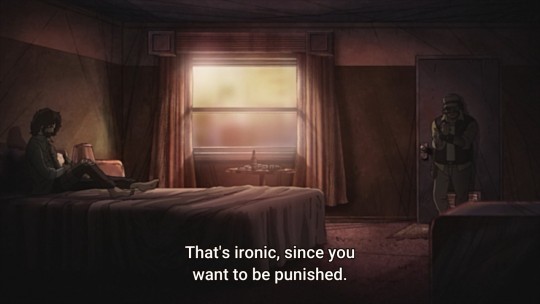
Speaking of sequels to shows I liked, Nomad doesn't so much improve upon its predecessor but steamrolls right over it. This is a tall order, since Megalobox was surprisingly good for a sports shounen and had a real nice, heartwarming ending that Nomad instantly negates for purposes of drama and everyone being extremely miserable. That sounds like a pretty terrible idea - and it would be, if Nomad wasn't as excellent as it is. To call it not the same show would be an understatement, because it's a true sequel, not just the same characters doing their thing some more, or new characters doing the same thing as the old ones did. Indeed my biggest problem with Megalobox was that it still closely adhered to its genre template and was very predictable; Nomad fixes this issue thoroughly. Nomad is about questioning what being a hotblooded shounen protagonist eventually leads you to, and how to fix everything you screwed up by being one. You could call it a deconstruction, but that term has been so abused for cynical, edgy "thing you like actually sucks" takes that I feel like it doesn't really fit here. Nomad isn't cynical at all, it's just a character drama about some boxers past their prime, and it being a sequel to a show that is indeed rather formulaic just enhances the experience. My biggest issue with it was that I really like what they did with Joe in this story, so the big focus on Mac's backstory felt like a distraction for a long time. But in the end that turned out to be absolutely necessary to make the ending work. The ending's just great, by the way, and I shall say not more about it. 9/10
Odd Taxi
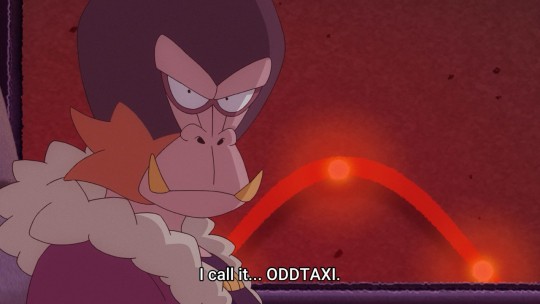
Yeah boy, here's the show that has apparently become somewhat of a "greatest show you didn't watch" meme, which I can feel smug about because I don't need YouTubers to tell me what's good and followed this from day one. Anyway, Odd Taxi is indeed great, the greatest show in a few years even. What starts out as seemingly a relaxed hangout show in the vein of Midnight Diners quickly turns into a psychological murder mystery while never losing its quirky humor. The character writing is outstanding, with even small bit players being on a level that the average anime wishes it could have for leads. And the rollout of the mystery is exemplary, with answers given and new questions raised every episode with a satisfying and logical payoff in the end. This is also the rare anime that has rock solid production from the first to the last second; it's never really flashy but excellently done and highly consistent nonetheless. And the music just owns. I have a few complaints, mainly that there's a few logical weaknesses in the story (which wouldn't even register in a lesser show, but sticks out here since the rest is so immaculately constructed) and that the ending overextends on the emotions when the rest of the show is so reserved and dry in comparison. But those are only the reasons why I didn't give it perfect marks, and I almost did that anyway. 9/10
#Zombieland Saga#bakuten#yakunara mug cup mo#vivy: fluorite eye's song#super cub#shadows house#ssss.dynazenon#thunderbolt fantasy#nomad megalo box#odd taxi#anime#review#spring2021
38 notes
·
View notes
Note
Hey, I follow a WC YouTuber called Moonkitti and she'd uploaded a video called "Warrior Names". She kinda slams traditionalism and also demonstrates she has no idea what exactly it is. Like she shows some prefixes as examples which has Tree and Dirt as acceptable and Jay isn't, despite the inverse being true. I know she mentions she's not against it in concept, but that it was being enforced to limit others' creativity, but I have really mixed feelings about it and wanted to know your opinions.
Hello there, Ruddles! I hadn’t heard of this person before but I went and watched this video and I think I understand where your mixed feelings might be coming from. This video is trying to do a lot of things but, in my personal opinion, it’s doing none of them particularly well.
There’s three major things happening all at once: 1. a legitimate personal reflection about how certain traditionalists acted towards this person in the past and how that impacted her (4:50; 6:20); 2. an incorrect and misleading explanation of what traditionalism even is and very clearly no understanding of why it appeals to people, and therefore very little empathy towards people who use the style; (5:13; 6:00); and 3. (from an outsider stance as someone who likes deconstructing arguments for fun) a fascinatingly messy argument both in favour of Erin Hunter while using Erin Hunter’s various (and typically more incompetent) choices as justifications for… everything and anything.
It’s a mixed bag to be sure! To start with, I don’t think there’s anything wrong with saying that some people who use the traditional style are jerks. It’s very true. I remember those days too. Some people genuinely did crash forum threads just to mock and belittle other people. It was terrible and I think it’s totally legitimate to be upset about that.
I think the argument that everyone who uses traditionalism behaves that way is bad faith, however, and I also question the confirmation bias happening at 6:54, because I only ever see people talking about traditionalism for themselves, because that’s the spaces I hang out in. I wonder if Moonkitti has ever actually looked for traditional forums and sites, or if she’s just taken for granted that they don’t exist and everyone who uses the style is waging their own personal crusade. That’s not something I endorse in any way, by the way. Don’t anyone do that.
The second topic is personally the most frustrating because at points she’s almost right. But her definitions are incorrect and explanations simplify in a way that isn’t helpful to anyone. She’s not trying to actually give an account of the style and then point out the ways it doesn’t work or shouldn’t exist or anything like that: she’s half understood the idea and gone, “That sounds dumb.” This is in fact what she claims traditionalists say about other styles (7:22), which I disagree with: traditionalism is based mostly on having a set framework in place and then fairly rigorously debating what works and doesn’t within that world set-up. Plenty of names that are traditional sound pretty silly, but that doesn’t mean we knock them back wholesale. The whole point of the style is there is a method. Making judgments based on looser qualities, like sound or flow or imagery, is more of a lyrical approach.
Anyway, she doesn’t even seem to have gone to the effort of learning about it herself before deciding to preach. I think that’s tacky. It’s exasperating to me, because it’s not like there aren’t a ton of resources out there: if nothing else, traditionalists are good like that! We love lists and archives and referring to rules we’ve written out. That’s one of the things she’s correct about. She frequently refers to the fact that traditionalism is fan-made (2:25; 3:59; 6:45), but she does so as if this is a bad thing, which it’s not. Traditionalists are aware it’s fan-made: we are, after all, the fans who made it. That’s the whole idea.
Which brings me to the third topic: she doesn’t seem to fully understand why traditionalism exists and why it brings joy to people who use it. That’s an issue, because much of her argument is based around “well, canon.” She mischaracterises traditionalists as people who are “taking things too seriously” for being creative–i.e., she recognises that the entirety of traditionalism is fan-made, but can’t seem to understand why fans would elect to create rules to follow; it seems to cancel out the creativity in her world-view. She also repeatedly refers to the fact that she doesn’t need a traditional system to enjoy the Warriors world (0:26; 7:17; 8:28; 9:05)–to which I reply, your mileage may vary–and seems to look down on people who are pulled out of the story by “a silly name,” unlike her or Erin Hunter, who don’t take things “seriously.”
The major problem I have with this approach is that it shows a fundamental misunderstanding of the value of good world-building–or even some idea of what it looks like. She claims a strict system would result in a boring story (which perhaps would be true for her, who knows: again, mileage may vary) (8:28), but the issue I have is that she says: “don’t get me wrong, warrior cats is not perfect, but the least of our troubles with the quality of these books is how strange these names are. Sure, Bouncefire sounds weird and doesn’t seem realistic, but if you’re worried about this story’s realism, consider the fact that we have about fifty cats who live together who barely gossip except if it’s about a housecat” (1:06).
She uses the word “realistic” throughout the whole video, as though the goal of using a traditional style is to make Warriors realistic, which in my opinion it’s not. Plausible, yes. Believable, yes. Cohesive, yes. But not realistic. These are, after all, talking cats with religion. I myself multiple times a year refer to the fact we’re all getting excited over “feral cats talking to stars in the forest.” There’s no pretense there! But the thing Moonkitti argues that actually makes me mad is that, because it’s not real, nothing matters.
And that’s absolutely horse-apples. It matters that the names in canon don’t have structure, because the world of Warriors doesn’t have structure and that is the underlying problem of the series. That is part of why the series is not well-written. The world doesn’t have structure or consistency in how it is built, and the run-on effect is that characters are frequently flat and their decisions–even their deaths–are regularly made meaningless by the world of the story. The world-building is inconsistent and poorly planned, and the run-on effect is that plots regularly force characters who are supposed to be intelligent or even an average amount of smart into being unbelievably stupid simply for the sake of furthering it, and the stakes of the stories are constantly forced to increase to squeeze any amount of impact out of the plots because the writing itself won’t do it.
There is no hierarchy from most to least when it comes to the quality troubles of Erin Hunter’s work. The issues in Warriors are not stand-alone. They are interconnected. It’s silly to pretend that transformative world-building, which is what traditionalism is, is somehow a superficial, ornamental thing and not simply another way for fans to mend some of what makes Warriors “not perfect,” like any other AU or fandom meta. Canon invented the name-change custom (7:43)–and repeatedly made it messy, and shameful, and had no idea what they wanted to go with. Traditionalism mended that and made it better. If you can recognise that the series isn’t perfect, I don’t think it’s a stretch to also recognise and acknowledge different ways of how fans react to and deal with those imperfections in fan-works, such as role-playing and fanfiction and OCs.
Moonkitti’s repetitions that this is a fantasy series and it’s not real so stop caring frankly reminds me a lot people who get uncomfortable and defensive when you analyse and discuss a piece of media in any kind of critical or thoughtful way and will tell you don’t be so serious. In my case, these people tend not to realise that, for me at least, this is fun--and it’s worthwhile and important to do. It’s also my actual job, in the daylight hours. (Here it’s just a hobby).
So tl;dr: Erin Hunter doesn’t take Warriors seriously–and that is the problem. The canon naming style is a symptom of how little effort Erin Hunter puts into consistent or meaningful world-building. Traditionalism exists as some fans’ attempt to craft a solution for themselves, and I include myself in that.
Moonkitti’s approach to explaining traditionalism from a place of 1. not being interested in understanding it and 2. being oddly defensive of Erin Hunter, the creative team behind all of canon’s terrible weird writing choices, rather than critical of said choices and choosing instead to blame fans for wanting canon to be better and then acting on that desire, feels a bit in bad faith to me. I’m sad to hear that she had such bad experiences with traditionalists in the past, because that’s awful, but I also feel strongly that it’s a good idea to know what you’re talking about before you step onto the stage like this.
For instance, she says, “There’s no real argument for why [certain] names [should] not be in the series,” (2:13), but, well. I’m here and this blog is my seven-years-and-counting argument. I like to think it’s often a persuasive one, too!
#good god this is long#ALSO it goes without saying but i'll say it just in case: no-one is to go to this person's channel and leave any kind of rude comment#i like to believe none of you would even think of that but i'm saying it now: don't.#if you don't like what she's said just move on and go do something nice. plant a flower. tell a friend you love them. do that kind of thing.
29 notes
·
View notes
Note
A question about your Lance meta - you keep calling Lance the heart of Voltron but isn't Allura herself the heart of Voltron? Like Lance himself calls her the heart in show
You don’t think it’s a titch ironic that someone would call another person the heart while providing them with emotional certainty and support?
To be a bit more direct, what Lance is explicitly saying is this is the role of the Blue Paladin. He prefaces it by saying “The Blue Lion chose you for a reason” implying everything that follows is what Blue seeks in a paladin.
My personal take on the whole Lion choices is that the first paladin they chose reflects their virtues the most clearly. Thus, with the information that the Blue Paladin is the heart of the team, it makes sense that Lance, who was Blue’s first choice, embodies those virtues to the core.
Furthermore, I would argue that Allura is essential to Voltron, but she’s not the heart. Not the way that’s usually conceptualized in ensemble shows. So let’s talk character roles for a second.
Simply enough, protagonists have a tendency to come in sets of five, and, they fall roughly along these lines.
There’s the Leader. This is usually the main character. When you see people assuming the Black Paladin is the most/only important character, that’s because they’re falling into this cognitive trap. The Leader is virtually always the face of the team and the final decision maker, the one who is thematically opposed to the main villain, and usually the show is named after them.
The leader has a Right Hand. Virtually always, a dynamic force who thematically opposes the Leader. If the Leader is fiery, passionate, and tactless, the Right Hand will be a cool, aloof perfectionist. If the Leader is compassionate, the Right Hand is callous. They’re set up as a significant foil. This sense of opposition basically means that they usually walk a fine line between the Leader’s best friend and worst enemy.
Then, there’s the Brains. While the Leader and Right Hand are usually more flexible, able to accommodate a wide variety of characters, Brains is a bit more rigid- they are, in short, the intellectual, the cognitive, They-Who-Exposit. Usually fits some manner of nerd stereotype and is often framed as lacking in “street smarts” or social skills.
The second skill-defined character is the Brawn. Sometimes stoic and honorable, sometimes bloodthirsty and brash. Usually the physically largest member of the team and defined by strength. Sometimes set up as an opposition to the Brains as someone with more “practical” skills versus the erudite manner of Brains.
And then, of course, the Heart. The Heart is the compassionate, emotional, nurturing member of the team. If there’s a healer, it’s probably them. While this sounds wonderful... it’s worth noting the Heart is one of the most chronically disrespected roles in the hero team. Virtually always, if you have a hero team with only one girl, she’s the Heart. There’s often a point made that the Heart is weaker than all of their associates, has less cool abilities, and struggles with feeling useless or not being able to keep up.
Keep in mind that TVTropes, which, for better and for worse, reflects popular media attitudes pretty well, calls this role “The Chick” and defines it thusly:
The "feminine", "spiritual", and "heart", aspect of the Five-Man Band... and generally the only woman.
It's the people she gathers and keeps at her side who'll do a lot of the heavy lifting. She'll encourage loyalty and teamwork, give them the courage or hope to unlock their true potential, be a Token Good Teammate that keeps her friends from Jumping Off the Slippery Slope. She's usually a Nice Girl, but her demeanor can go anywhere from shy and demure, to brave and adventurous. She is rarely The Heroine of a story.
Her functional role will often be The Heart, the social influence of the group. Sometimes this means she'll serve as the Team Mom, taking care of the smaller details, both within the group and in the world outside. She looks after innocents, delivers The Aesop, mediates the arguments, and slaps some sanity on The Lancer before he ends up getting too dark. It's not the coolest job in the world, but it's helpful.
Note the implications: passiveness, especially in the sense that, when written poorly, this character sacrifices their own emotional depth to be a sounding board, support, and voice of reason for the entire rest of the team. At a glance, they’re flattered by being treated as so mature and wise, where their only “problem” is not being able to help enough- but, like I said. I think that the Heart is probably the single most widely disrespected hero out of this formation.
Their work is devalued and they’re are often regarded as far more passive than they really are. This is especially true in more individualistic stories, because the Heart is in essence defined by being not just a team player, but the team player. So they’re treated as someone who “settles” or is less ambitious than their peers.
Now, I think because the Heart is, for lack of a better word, traditionally feminine, pretty much every previous incarnation of Voltron has had Allura in this role.
In prior versions of Voltron, the formation went like this:
Keith was the Leader, with Lance as his Right Hand. They usually contrasted in that Keith was the calmer and more sensitive one, while Lance is virtually always the literal and figurative hothead. Pidge and Hunk slotted into Brains and Brawn, this left first Sven (for his incredibly brief tenure on the team), then Allura, as Heart.
Here’s the thing: VLD is a complete departure from that setup on the most fundamental level of how these characters were conceptualized.

Shiro is the clear and obvious Leader archetype. Thematically he’s set as Zarkon’s rival, much emphasis and significance is placed on his relationship with the Black Lion. And he has multiple connections to the team and to the conflict, which is significant, when...
Keith is an equally obvious Right Hand. Again, it’s worth noting his prior incarnations, which have held Shiro’s position, are far more levelheaded, sometimes to the point of being stoic and hard to read. When the Leader archetype is a joining thread to the team, Keith, in a much more classic Right Hand manner, largely defines his position on the team by his loyalty to Shiro- and his connections with the team, and his ability to lead and inspire them, is incredibly tenuous.
Pidge and Hunk are the only ones who have remained in their usually established roles of Brain and Brawn- in this case, playing up not the difference in intelligence versus brute strength, but, the difference between highly cognitive, erudite, stereotypical intelligence versus highly tactile, practical, and even artistic intelligence. (Look at the careful presentation and flair Hunk puts into his cooking, for example)
(I’ll get back to Lance)
Now, when the formation changes in s3e1, I would say that people’s narrative roles actually don’t change as much as they appear to.
What appears to happen is that Keith becomes the Leader, Lance the Right Hand, and Allura steps up as the Heart. This is what would be implied by Lance telling Allura this in s4e6.
But remember, the Lions are arguably connected to these roles- and our heroes are limited by how much they can act like this given role.
Keith is shown to be repeatedly frustrated by Black, demanding answers they do not give, struggling to maneuver their larger and heavier body. He’s framed as unworthy of the Leader mantle as illustrated partially by the fact that the other two Leader figures- Zarkon and Lotor- both have very disproportionate fights with Keith, in which both are shown to utterly dismiss Keith, and not just in a, “I am evil and greater than you” manner, but, in that they do not, in any meaningful thematic manner, recognize him as a rival, nor does he give them any reason to. (more on that, here)
Rather... the person who steps into the Leader mantle, who emerges central to plot lines, and is the one person acknowledged by Lotor (again, when the Leader is often defined strongly by their role as the equal-and-opposite to the “head” of antagonist forces)?

It’s Allura’s armor, Allura’s obtaining of the Blue Bayard, that’s given screentime when we don’t see Lance or Keith obtain their respective new bayards. It’s Allura who turns the tide in s3e2 by allying with Blue, Allura who fends off Lotor and rescues the team in s3e3- and in s3e4, it’s Allura who has a personal reason for challenging Hira and gets a big dramatic fight with her when everyone else is, uh, football tackling each other. And, reading more speculative... it’s incredibly likely that Lotor, who emerges as the main antagonist of s3, is a ghost from Allura’s past, one who she has a connection to even more than implied by their subtle “honor duel” on Thayserix.
When Shiro vanishes in s3, Keith remains a Right Hand figure. If anything, he doubles down on his aspect working with Black, embodying the traits that are so stereotypically a Right Hand thing- the risk of going too far, losing control and focus and getting everyone in trouble, obviously destabilized without his appropriate counterpart of the Leader.
Instead, it’s Allura that rises to the Leader position. Who is defined by her nobility, strength of will, and intimate connection to the overarching conflict of the show.
Now... where is Allura heavily shown to struggle- on many occasions?
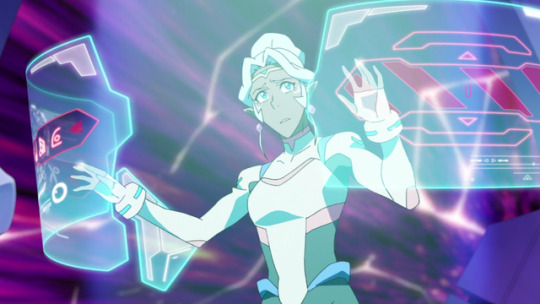
S1e2- Allura decides the best way to unite and motivate her team is, in Coran’s words, “[be] really, really mean to him.”
S1e4- Allura attempts to get Pidge to open up to her in probably the least reassuring manner possible.
S1e10- Allura makes plan based on the assumption that her team will leave her to her doom for the sake of the greater good, genuinely thinks this is a smart idea and definitely won’t get shot to hell by these heroic dorks.
S2e1- Allura is manifestly bad with children.
S2e3-thru-s2e8 (Blade of Marmora plotline)- Allura has significant trust issues that, while entirely understandable, weaken the team and make their connecting with a powerful potential ally very difficult.
S3e1- Allura is frustrated by and struggles with the idea of engaging in pleasantries rather than “serious business about the protection of the universe?”
S4e4- Allura is very bad at acting.
Allura’s Vlog- by her own admission, she had to learn to be a diplomat, even though this is something her culture prioritizes.
This isn’t a complete list, per se- but there’s a clear thing here.
Where Blue’s role in Voltron is defined heavily by empathy, emotions, interpersonal bonds, and connecting with others, Allura is not a sentimental team-mom nurturer. She’s an amazing, essential person with some incredible talents and skills, and, like I said, the writing does the furthest thing from disregarding her.
But Allura shares the Leader position with Shiro. As mentioned, where the Leader often is directly opposed by a main antagonist, at the head of the empire are two equals in power: Zarkon and Haggar. Shiro thematically is Zarkon’s equal and opposite, and the two have their dramatic showdowns, but Allura has her own rival- Haggar, and they’ve had their own brawls of magical might.
The point is that Allura is not merely defined as something other than the Heart, she’s shown frequently to fail at the things that are the integral qualities of the Heart.
Now... conversely... I think we’ve left Lance hanging long enough.
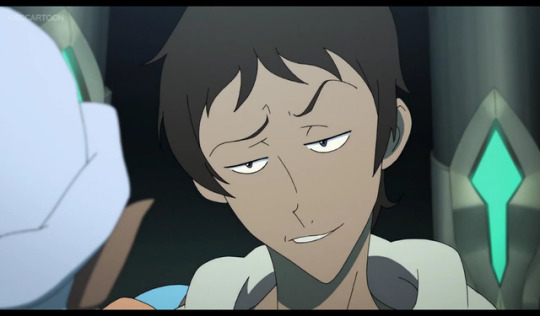
Let’s bring back what I said about the Heart, shall we?
The Heart is the compassionate, emotional, nurturing member of the team. If there’s a healer, it’s probably them. While this sounds wonderful... it’s worth noting the Heart is one of the most chronically disrespected roles in the hero team. Virtually always, if you have a hero team with only one girl, she’s the Heart. There’s often a point made that the Heart is weaker than all of their associates, has less cool abilities, and struggles with feeling useless or not being able to keep up.
Lance:
Out of a whole team of people dealing with emotional issues, Lance is by far the most stable and the most prone to discussing his issues before they blow up.
Relationships with other people are a major preoccupation for him. Consider one of the major things he talks about frequently is that he wants to make a romantic connection- not just “obtain hot girlfriend” but as he discusses in s2e2 and his vlog, he’s actually looking for someone more like a soulmate- he only wants to make a connection that will be incredibly meaningful and lifelong, but he’s easily charmed by people being happy or enjoying his presence.
Of the team, he’s the only character who forms an obvious emotional relationship with every other member, in the case of Coran and Allura, within seconds of meeting them. Also with both Coran and Allura, Lance is the first to interact with them.
He flat-out has an obvious struggle in s1 and s2 with “not having a thing”, feeling like everyone else has neatly defined roles and contributions, and actually carefully interrupts Allura and distracts her right before she lists Blue’s virtues.
On that note- Lance is shown to have such a keen sense of feelings and other people that he’s able to flat-out manipulate situations by inducing certain emotions at key points. What I mentioned with Allura he did before, in almost the exact same manner, to take Iverson’s attention off Pidge. He very specifically annoyed the person at a key moment so they’d be frustrated with him and forget what they were talking about before.
Also, in s4e4, Lance is the only good actor on Team Voltron! In both that episode and prior events, Lance is the one who has a good sense of “the show” and is putting on a consistently good performance.
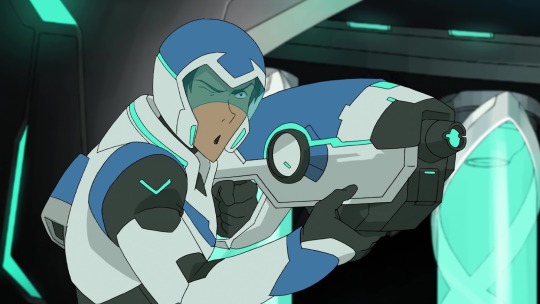
Lance’s weapon is even, to me, a pretty blatant allusion to his status as the Heart rather than the Right Hand. Force- which did characterize Lance as a Right Hand figure, also gave him guns, but they were simple pistols designed to accommodate a very independent, up-close-and-personal fighting style which supplemented his shots with a lot of brawling, frequently putting him literally back to back with swordsman Keith.
However, in VLD, Lance’s weapon is a long-range rifle and his specialty is precision sniping. In action, we see Lance sweeping the battlefield, not hunting the single top-priority targets and taking them out, but, rather, repeatedly checking on his allies and offering precise assistance where it’s needed.
Lance fights, and thinks, like someone whose first priority is supporting others. And his big hero moment in s4e6? He’s not the one doing the glowing superpower boost that saves everyone. That’s Allura.
But Lance is the one who made it happen. It’s Lance who put personal glory second, who defined his own virtues in the same moment he verbally gives them to someone else.
It’s Lance... whose growth as a hero seems to have, as one of its major plot points, setting aside his desire for personal glory to focus on being there for other people, not because he isn’t important, but, because time and time again, he’s shown to do better and be happier when he’s not doing things for personal reputation.
And this is actively framed with the Lions: when Lance is trying to have his “moment”, Black ignores him. When Lance makes the move to support Keith because this is what Keith, and the entire team, needs at the moment, Red- the difficult to please, stubborn Lion, declares that Lance is worthy and calls for him without Lance having ever even presented himself to Red as a candidate.
Because ultimately, Lance was the Heart all along. His strongest actions, his emergence as a true hero, comes from his compassion and comes from his awareness of emotions. And to me- I think the writers are actually setting up a really interesting analysis of the historical devaluing of the Heart role- about how much Lance seems to try to avoid acknowledging his actual heroic qualities.
And how much Lance specifically tries to emulate the classic sort of Suave Casanova, Ruggedly Heterosexual Hero Man- when again, his true position as a hero is very stereotypically feminine. With the obvious implication being- Lance knows what kind of person he really is, and he knows that this is viewed as “unmanly”, “passive”, “weak”.
But these qualities are embodied by a fifth of Voltron. They’re qualities that, in this setting, are written in the stars as the domain of heroes. Not just part of the strongest force in existence- but one of the two things that literally holds the Defender of the Universe aloft.
#voltron legendary defender#vld#Lance#Allura#Shiro#Keith#Hunk#Pidge#readmore#monster post about team roles and mostly Lance and Allura#Anonymous
297 notes
·
View notes